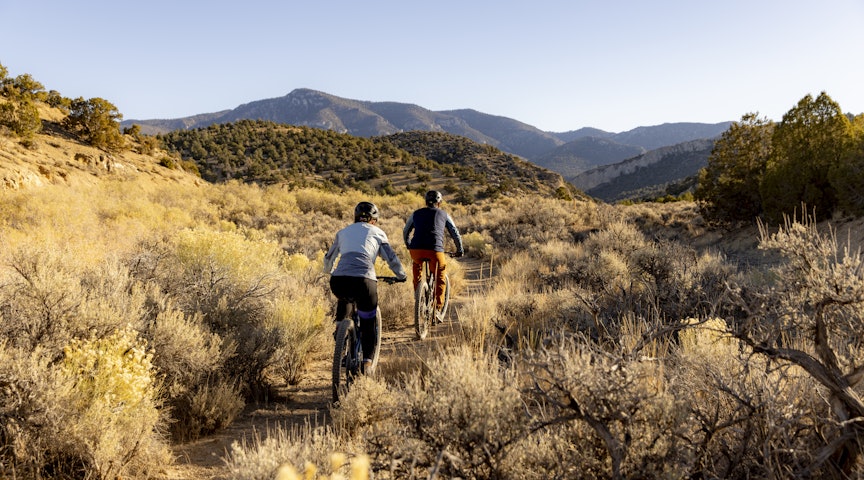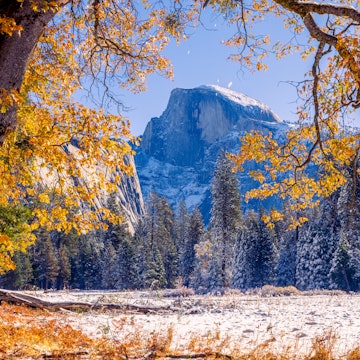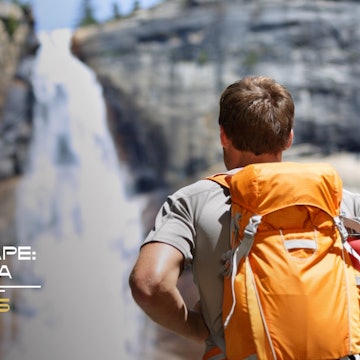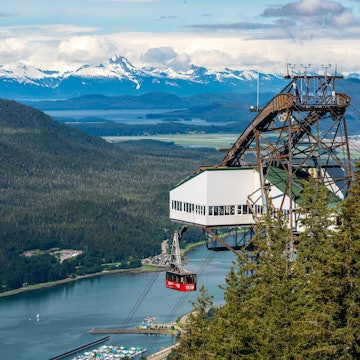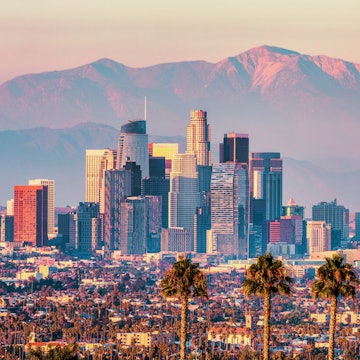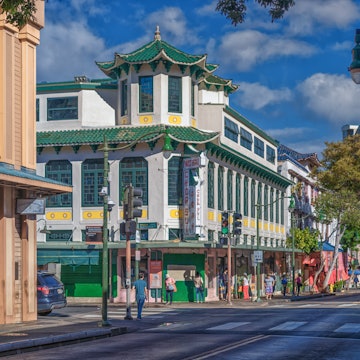

Sequoia and Kings Canyon National Parks are connected by Generals Hwy © iStock / Getty Images
The United States was built for driving. Together, the 48 contiguous states comprise more than 3 billion sq miles of land and 4 million miles of public roads (nearly 200,000 of which are highways), and within those miles lie 53 of the USA's 52 national parks.
While you can certainly road trip from park to park, traveling by car doesn’t always allow you to spend much time at individual parks – especially if you’re limited to just a few days of travel. To make the most of your trip, try these one-day driving itineraries for five of the lower 48’s most epic national parks.

Sequoia and Kings Canyon National Parks – California
Sequoia and Kings Canyon are actually two separate parks but, because of their proximity and connectedness via Generals Hwy, most visitors consider them one and the same. Even in the height of the California summer, Sequoia and Kings Canyon National Parks have that crisp, cool air that makes you want to nosedive into a pile of raked-up leaves, and the towering sequoia trees can turn any person into an avid forest bather.
Together, these parks are epically vast and deserving of more than just one day but, when that’s all you have, here’s how to make the most of it:
9am
Arrive at the park. Crowds start amassing by 10am, so it’s better to get there even earlier than 9am. Expect longer lines during the weekends.
9am to 10am
Enjoy a scenic drive along Generals Hwy. From the park entrance, it takes an hour to get to the sequoias.
10am to noon
Wander through Giant Forest and marvel at Tunnel Log, Moro Rock, and General Sherman.
Noon
Have a picnic lunch on Beetle Rock.
1pm to 3:30pm
Take a hike to a granite dome on Little Baldy Trail.
3:30pm to 5:30pm
Gaze up at the second-largest sequoia tree, General Grant in General Grant Grove.
5:30pm
Enjoy the drive along Kings Canyon Scenic Byway.
15 unforgettable experiences in US national parks

Death Valley National Park – California and Nevada
At 5312 sq miles, Death Valley National Park is the largest national park in continental USA. Known as the “land of extremes”, Death Valley exemplifies the desert: it’s (very) hot, (extremely) dry, and (incredibly) low. Despite its claim to fame as the hottest, lowest and driest national park, more than one million people bravely voyage to Death Valley each year.
If you’re up for the challenge, follow this itinerary to make the most out of Death Valley National Park in just one day.
7am
Arrive at the park. You must get an early start at Death Valley National Park – temperatures soar to over 100°F (38°C) by 10am.
7am to 9am
Adventure to and around the Mesquite Flat Sand Dunes.
9am to 9:45am
Study up on mining history at Harmony Borax Works.
9:45am to 11:45am
Gaze way, way down at badlands and basins from Zabriskie Point and Dante’s View.
11:45am to 1:30pm
Backtrack a bit to Devil’s Golf Course and Badwater Basin.
1:30pm to 2:30pm
Take a quick detour off of California Rte 190 to travel the one-way Artist’s Drive and enjoy mountains of blue and mauve at Artist’s Palette.
3:30pm to 5pm
Travel north along Hwy 190 until you get to Ubehebe Crater, which is 600ft deep and a half-mile across.
5pm to 6pm
Watch rocks move at the Racetrack Playa.
6pm
Travel back down Hwy 190 and stop for a cold drink at the rustic Stovepipe Wells Village before leaving the park.

Yosemite National Park – California
Best known for its towering cliffs and crags, Yosemite National Park has skyrocketed to the top of the national park list, enticing more than four million visitors each year. Within its nearly 1200 sq miles, Yosemite contains crisp, bright green meadows, plentiful peaceful wildlife, gushing waterfalls and crystalline pools, towering granite monoliths, and ample scenic byways and lookouts.
It’s a haven for extreme rock climbers, casual hikers, and nature lovers alike – here’s how to get the most out of 24 hours in Yosemite National Park, Instagram-worthy backdrops included.
7am
Arrive at the park via Tioga Pass (reservation required).
7am to 9am
Visit Tuolumne Meadows, and be sure to hit Olmsted Point, Tenaya Lake, and Soda Springs.
9am to 11am
Enjoy the scenic 56 miles of Tioga Road (Hwy 120 East) that takes you to Yosemite Valley. You must have a reservation. Note, though, that Tioga Road is only open during the summer and early fall, and then it closes due to snowfall. If you visit Yosemite in the winter, you may want to stay on either the east side of the park (Tuolumne area) or in the valley.
Yosemite National Park: a guide to your first visit
11am to 3pm
Venture around Yosemite Valley. Hike to lower Yosemite Falls, poke your head inside the Ahwahnee Hotel (formerly The Majestic Yosemite Hotel) and Ansel Adams Gallery, and snap valley-view photos of Half Dome and El Capitan.
3pm to 4pm
After you’ve explored the valley, see the entire thing at once from Tunnel View on Wawona Road (Hwy 41).
4pm to 6pm
Take the short hike to Sentinel Dome, one of the easiest ways to get expansive views of the entire park.
6pm to 6:30pm
Have a picnic dinner on Sentinel Dome.
6:30pm to 8:30pm
If the sun hasn’t set already, enjoy the show and the day’s last light at Glacier Point.

Mammoth Cave National Park –Kentucky
Mammoth Cave isn’t one of the most popular parks on this list, but it still draws an impressive two million visitors each year. It’s one of the smaller national parks – encompassing just under 83 sq miles – but, boy, does it have a lot to offer.
Nestled in the Kentucky backcountry, Mammoth Cave emanates a somewhat gloomy yet grandiose vibe with its 400-plus miles of twisty, dark caves brimming with mind-boggling rock formations and tokens of a bygone era.
Because of the park’s relatively small size, it’s easy to see a lot in a short time. Follow this driving itinerary for the best 24 hours in Mammoth Caves National Park.
8:30am
Arrive at the park. Earlier is always better!
9am to 11am
Take the Domes and Dripstones Tour to learn about the unique rock formations inside Mammoth Cave – there's more than just stalagmites and stalactites! Your exact itinerary will differ based on tour times, but a good plan for Mammoth Cave is to book one tour for the morning and one tour for the afternoon.
11am to 1pm
Walk along the half-mile Heritage Trail, and take the brief Discovery Self-Guided Tour. Have a picnic lunch while you’re out and about (but not in the cave).
The complete guide to Mammoth Cave National Park
1pm to 3pm
Visit the many places that made Mammoth Cave famous on the Historic Tour.
3pm to 5pm
If you have any energy left for more hiking, take the one-mile Cedar Sink Trail for a rewarding view of several sunken water holes.
5pm
Explore the surrounding area of Park City, Kentucky, a teensy town that serves as the gateway to Mammoth Cave.

Petrified Forest National Park – Arizona
By far the least-visited park on this list – which is all the more reason you should visit – Petrified Forest National Park offers much more than its famous petrified logs. You can see plenty of mind-boggling sights just from the pullouts on the scenic byway through the park that connects Hwy 180 (south side) and I-40 (north side), including the colorful Painted Desert, and you'll drive the Petrified Forest Scenic Drive throughout the entire park.
However, to get the most out of your trip, you should do some sight-seeing on foot. Here’s how to make the most out of one day in Petrified Forest National Park.
9am
Arrive at the park via the north entrance off of I-40. You can reverse this route if you enter from the south side of the park on US Hwy 180.
9am to 11am
Enjoy expansive views of the Painted Desert on the one-mile Painted Desert Rim Trail.
11am to noon
As you drive along the scenic byway, pull over at Chinde Point, Picado Point, Nizhoni Point, Whipple Point, and Lacey Point to enjoy the views. Choose one at which to stop and have a picnic lunch.
8 US national parks where the best views are underwater
1:30pm to 2pm
Explore the historic Route 66 exhibit and take cool pics of the rusted-out car.
2pm to 3:30pm
Walk amongst Puebloan ruins at Puerco Pueblo and try your hand at reading petroglyphs at Newspaper Rock.
3:30am to 5:30pm
Check out the Agate House and Agate Bridge, Jasper Forest, Crystal Forest.
5:30pm to 7pm
Learn more about Puebloan culture at Rainbow Forest Museum, and then hike Long Logs Trail, one of the most concentrated areas of petrified wood in the entire park.
You might also like:
5 state parks that rival national parks
Zion or Bryce Canyon? How to choose between Utah's top national parks
7 best US national parks to take your kids
This article was originally published in October 2019 and updated in April 2021.
Take your United States (USA) trip with Lonely Planet Journeys
Time to book that trip to United States (USA)
Lonely Planet Journeys takes you there with fully customizable trips to top destinations–all crafted by our local experts.
